Time/Čas
Image by Eliška Jarvisová, Year 4

Time/Čas
Image by Eliška Jarvisová, Year 4
Time is our Theme of the Year for this year. It has been reflected on not just during assemblies but also in student work during lessons and in other activities.
Bekiw you can find excerpts from Mr Emmerson’s thought-provoking assemblies focused on time. Dr Brown shared his ideas relating to time too and also his spectacular hourglass, which was given to him by his father who made the wooden parts of it himself.
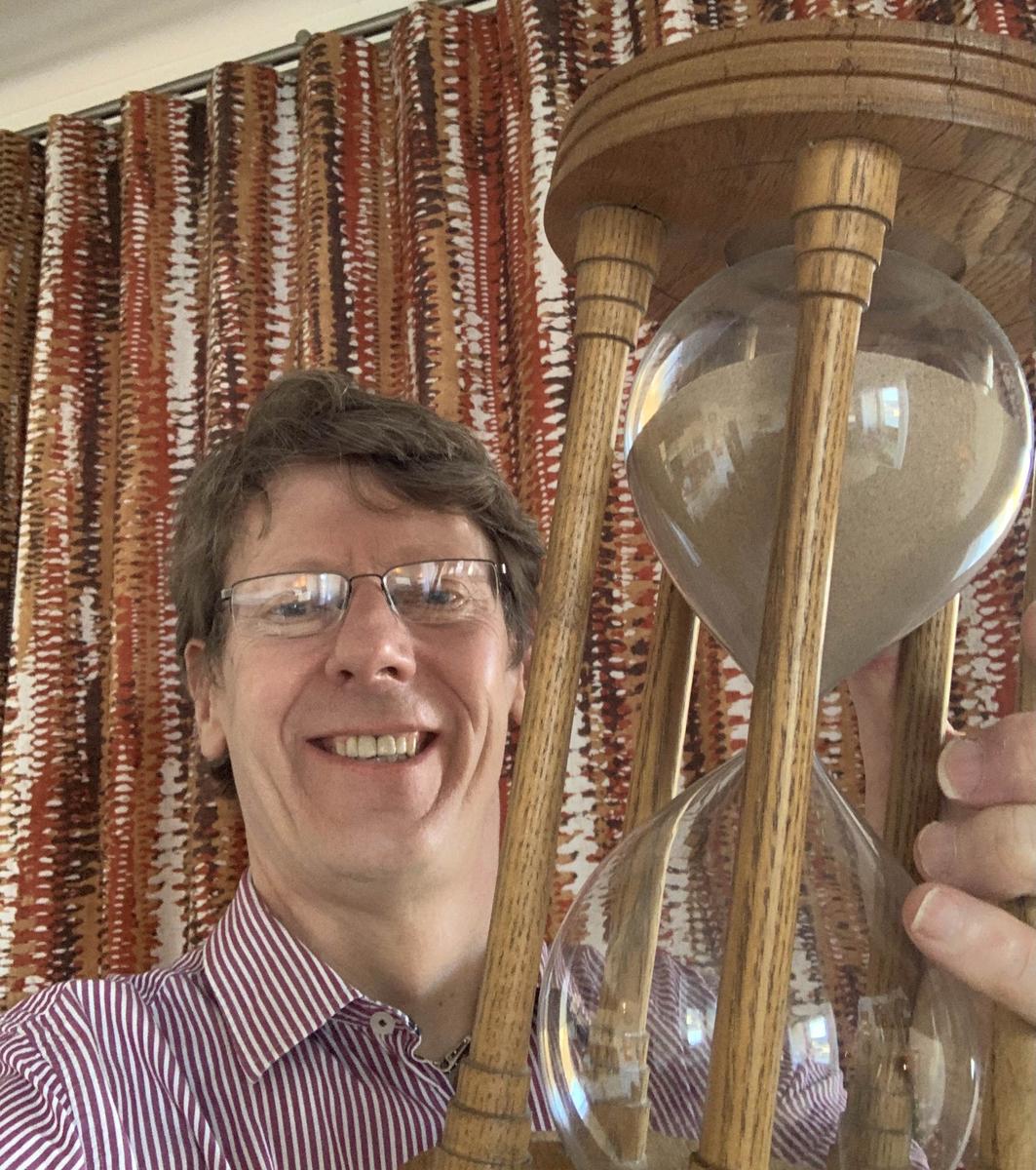

Čas je naším tématem roku pro tento školní rok. Odráží se to nejen během našich školních shromáždění, ale také v práci studentů v hodinách i v dalších aktivitách.
Zde jsou výňatky ze zamyšlení zástupce ředitele, pana Emmersona, na téma čas během jeho online shromáždění se studenty. Dr. Brown se také podělil o své úvahy týkající se času, a také o své velkolepé přesýpací hodiny, které dostal od svého otce, jenž jejich dřevěnou část sám vyrobil.


"Every action you take is a decision about how you will spend the time you have. So invest your time well in the things that matter. Work, friends, family, reading, music, travelling. Your time, your choice. But it is a choice and a choice that once made cannot be unmade. You will not get this day back. Make it count."
„Každý váš čin je rozhodnutím o tom, jak budete trávit čas, který máte. Investujte tedy svůj čas dobře, a to do věcí, na kterých záleží. Práce, přátelé, rodina, četba, hudba, cestování. Je to váš čas a vaše volba. Tuto volbu však můžete udělat jen jednou a potom už nemůže být změněna. Dnešní den nazpátek nedostanete. Tak ať stojí za to.“
Tony Emmerson, Senior Deputy Head/zástupce ředitele
"Recalling friends, places, and fun times is healthy. More than healthy - it is necessary. It’s ok to flirt with the past, as long as you don’t get seduced. Life is one way. These moments have gone. They are nothing but echoes. It is the now that matters, be it for better or worse.
We do owe it to ourselves to see the good in the now, and we owe it to the people around us too. It is easy to bring it each other down with tales of woe, but it is also possible to lift each other up by sharing the good things in life.
I'll never find a better time to be alive than now. These are words of English songwriter Peter Hammill." You can listen to the whole song at the link.
„Připomínat si přátele, místa a zábavné časy je zdravé. Více než zdravé - je to nutné. Je v pořádku flirtovat s minulostí, pokud se nenecháte svést. Život vede jen jedním směrem. Minulé okamžiky jsou pryč. Nejsou ničím jiným než jen ozvěnou. Záleží jen na současnosti, ať už je lepší nebo horší.
Dlužíme sami sobě, abychom viděli to dobré na současnosti, a dlužíme to také lidem kolem nás. Je snadné spolu bědovat, ale je také možné se navzájem povzbudit sdílením těch dobrých věcí v životě.
Nikdy nenajdu lepší čas na život než teď. To jsou slova anglického skladatele Petera Hammilla.“ Na odkazu výše si můžete poslechnout celou skladbu.
Tony Emmerson, Senior Deputy Head/zástupce ředitele
Mr McGrath's Year 1 Aqua students made short videos about passage of time and here you can see them all put together.
Studenti ze třídy 1A pana McGratha natočili krátká videa o plynutí času. Níže se můžete podívat na jejich sestřih.
This year we were celebrating PEGS, the Prague English Grammar School, and also making reference to time, the theme of this school year, specifically the relationship between PEGS and The English College through passage of time. Principles, teachers and students of the Prague English Grammar School inspired the Founders of the ECP. You can watch a recording of the event here.
Letos jsme v rámci Dne zakladatelů školy oslavovali pražské anglické reálné gymnázium PEGS, jehož zásady, učitelé i žáci inspirovali zakladatele ECP, a také jsme odkazovali na filosofii času, který je tématem letošního školního roku. Konkrétně jsme se zaměřili na vztah mezi PEGS a ECP v průběhu času. Na záznam z akce se můžete podívat zde.
Jan Kovařovic, PEGS alumnus and ECP Governor, made an inspirational speech during the event. Here is his quote: “Freedom, fairness and decency will always be at stake and must be defended again and again, and this requires personal responsibility and commitment. To cultivate these values, commonly perceived as traditional British values, is one of the main tasks of the English College, as well as to transmit the values of Anglo-Saxon education. And of course, the English College should lead its students, irrespective of their origin, to a deeper understanding of Czech culture.”
Jan Kovařovic, absolvent PEGS a člen správní rady ECP, během akce přednesl inspirativní projev. Zde je jeho citát: „Svoboda, spravedlnost a slušnost budou vždy v sázce a je třeba je bránit znovu a znovu, což vyžaduje osobní odpovědnost a odhodlání. Kultivovat tyto hodnoty, které jsou běžně vnímány jako tradiční britské hodnoty, je jedním z hlavních úkolů Anglického gymnázia, a důležité je i tyto hodnoty šířit. Anglické gymnázium by samozřejmě rovněž mělo vést své studenty, bez ohledu na jejich původ, k hlubšímu porozumění české kultuře.“
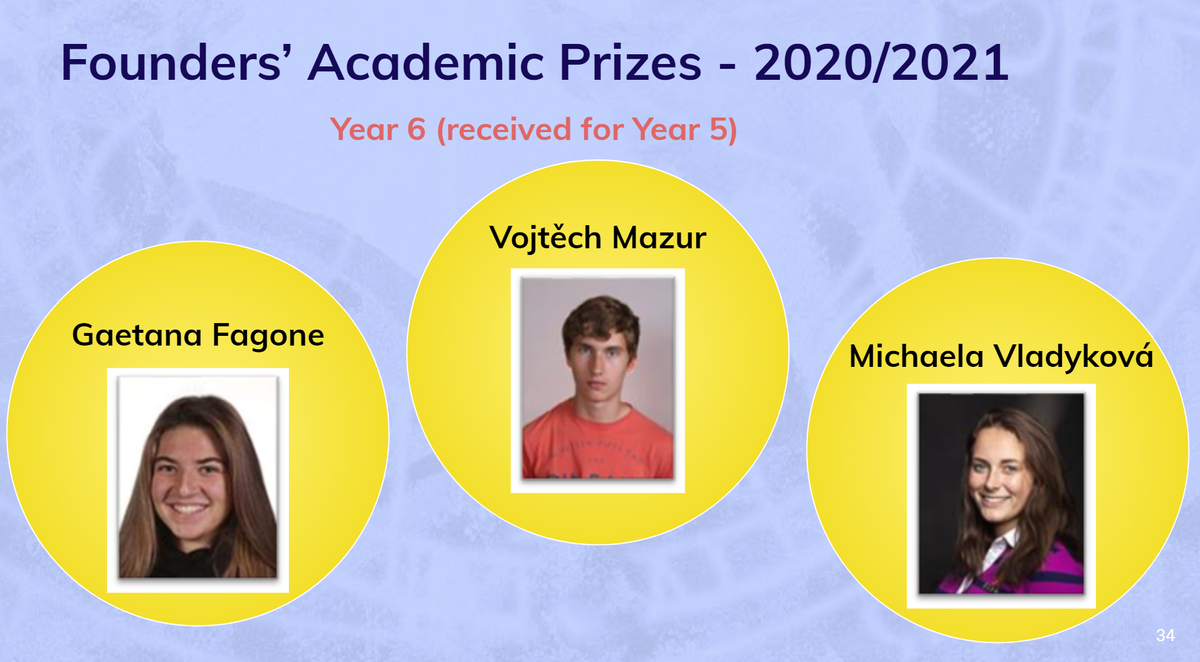

Founders' Day was also an occasion for announcement of successful students who gained dozens of various prizes - Prize Winners 2019/2020, Talent Award Winners 2020/21 and Founders' Academic Prize Winners 2020/21. You can find out about all the winners in the attached booklet.
Den zakladatelů školy byl také příležitostí k vyhlášení úspěšných studentů, kteří získali desítky různých ocenění - za nejlepší výkony v jednotlivých předmětech 2019/2020, za talent 2020/21 a za akademický prospěch 2020/21. O všech vítězích se dozvíte v přiložené brožuře (viz výše).
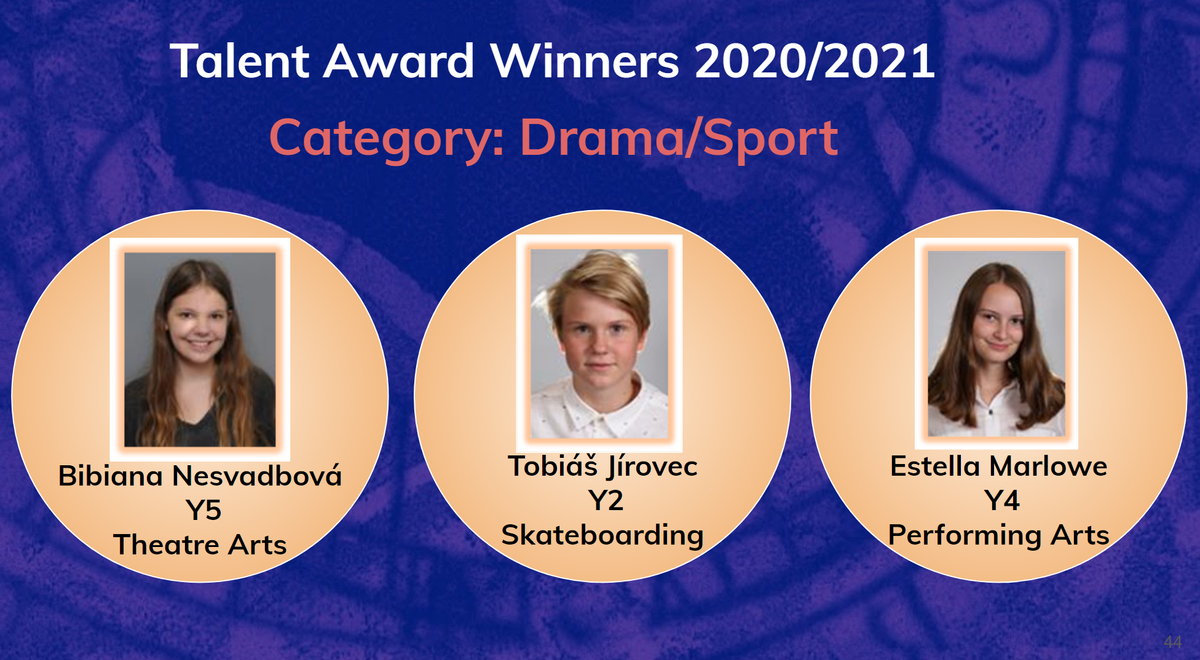

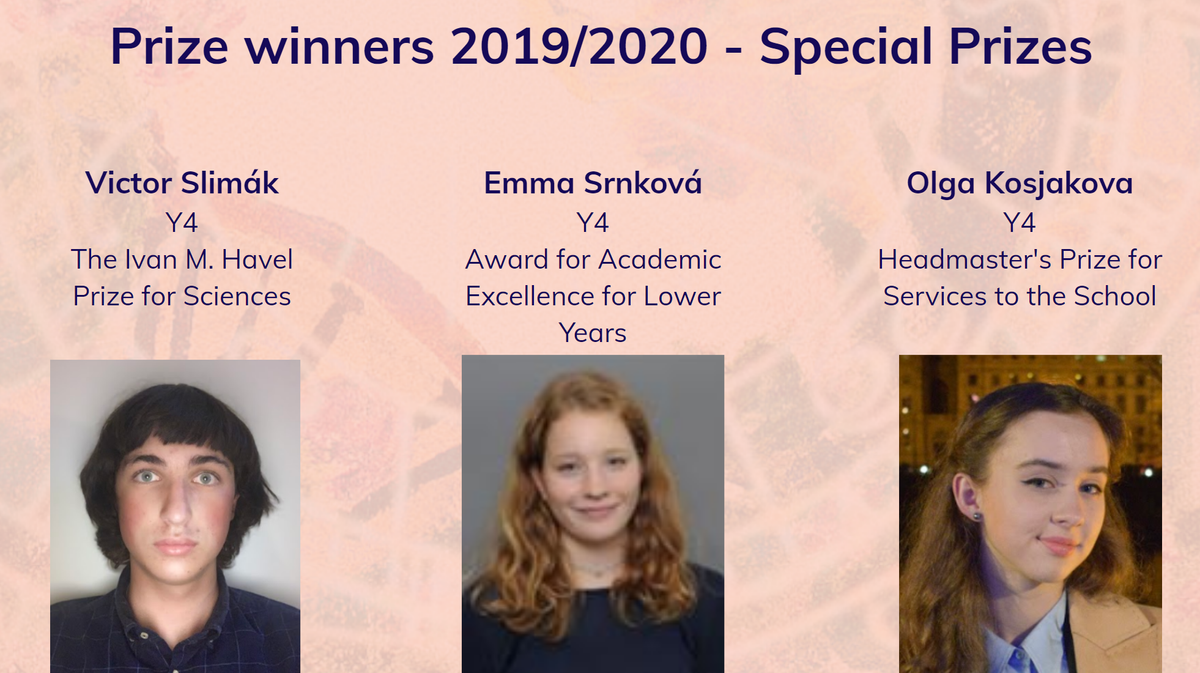

Here is Karolína Hájková's practice Physics extended essay focused on time, which fits perfectly with the school theme Time.
Přečtěte si cvičnou písemnou práci z fyziky na téma čas, kterou napsala studentka Karolína Hájková. Tato esej výborně zapadá do letošního tématu školního roku, kterým je právě čas.
Why does time only seem to flow in one direction?/Proč se zdá, že čas běží jen jedním směrem?
“As the seconds pass, we look back at what our lives have held. As the minutes pass, we see what fell through the cracks. Parts of our lives we withheld. As the hours pass, we think of what we learned, what we have taught, what we have forgot. As the days pass, we wish a lot could be returned. We wish we would have never fought you hope they forget me not. As years pass, you stand alone. They have all grown,
married and gone or on their own. As your life passes, you stand proud, looking how well they raise their own. You did well. Live on…”
( As Time Passes, Jenni-fiere M. Bivens)
What is time? Well, in simple terms, we can say that time is a number we read on a clock. But this is just too simple to say. Time has much more to it than just being a number shown on a clock. The proper definition of time is that it is the indefinite continued progress of existence and events that occur in an apparently irreversible succession from the past, through the present, into the future (Oxford Languages and Google). The SI unit for time is seconds. We could also say that this measurement is a scalar quantity, which means that it only has magnitude, but no direction. So scalar quantities often refer to time as being a measurement of years, months, weeks, days, hours, minutes, seconds and even milliseconds. We, as humans, use the concept of time to place events in sequence one after the other, to compare how long an event lasts, and to tell when an event occurs. These are the three key features of time.
Scholars do though wonder, how did we even come up with the concept of time? Time started to be investigated in 8000 BC. In Scotland on Warren field a lunar calendar was found and was dated to be from 8000 BC, which was during the Mesolithic period. The measurement of time began in Ancient Egypt at around 1500 BC. Time wasn't measured the same as it is now. For the Egyptians and for a further three millennia, the basic unit of time was the period of daylight. Later on, in 1250 BC, people living in Greece separated day and night into 12 hours each. The ancient Greeks had two words for time: chronos and kairos. The former refers to chronological or sequential time, while the latter signifies a proper or opportune time for action. While chronos is quantitative, kairos has a qualitative, permanent nature. Kairos also means weather in Modern Greek. The God named Chronos was the King of the Titans and also the god of time, in particular time when viewed as a destructive, all-devouring force. Then in 350 BC The Greek thinker Aristotle spelled out a fairly modern-sounding definition of time as “the calculable measure of motion with respect to before and afterness”, this means that time is a number of change with respect to the before and after.
Many people ask, what is the philosophy of time? Well, all animals except humans live in a continual present, with no sense of the temporal distinctions of past, present and future. Our consciousness of time is therefore one of the most important distinguishing features of humankind, and one of the things that truly separates us from the lower animals. Time is continuous and goes in an intrinsic direction or order, therefore this means that events go from the past to the future. Time is objective, and not subjective or dependent on its being consciously experienced. It is borne out by the almost universal agreement on the time order of so many events, both psychological and physical, and the fact that so many different physical processes bear consistent time relations to each other. An example of this is the rotation of the Earth or the frequency of oscillation of a pendulum. There are many differing opinions and approaches to what time actually is, many ideas have been put forward over the centuries. In the ancient philosophies of India and Greece, one major point of contention was whether time is linear or cyclical, and whether it is endless or finite. During the Age of Enlightenment in the 17th and 18th centuries, in early modern philosophy, humans considered questions about whether time is real and absolute or merely an abstract intellectual concept that humans use to sequence and compare events. Then, in the 19th century, philosophers began to question whether the present was really an instantaneous concept or a duration, and the conventionalists and phenomenologists all made their own contributions to the debate on time. Modern philosophy has continued to argue over whether time is real or “unreal”, whether time is tensed or tenseless, whether the present is instantaneous or a duration, whether the past and the future can be said to really exist and the manner in which objects persist through time. So, in general the philosophy of time has still not been investigated in depth, nor do we know properly if time flows in one direction.


Time is a very mysterious thing to consider. Did you know that there is a total of 31,557,600 seconds in a year or that time passes faster for your face than for your feet (assuming you're standing up)? I bet you didn't, because these types of things aren't really talked about when we discuss such a thing as time. Einstein's theory of relativity dictates that the closer you are to the centre of the Earth, the slower time goes. At the top of Mount Everest, a year would be about 15 microseconds shorter than at sea level, which is just so fascinating. Imagine that if you're on Mount Everest, you may be already in the year 2021, but other humans on Earth would still be in 2020. Poor them, considering how terrible this year has been.
Another thing that time hides under its surface is that what you think of as a day (how long it takes the Earth to rotate) isn't 24 hours, however it's 23 hours, 56 minutes and 4.2 seconds. The reason it's 24 hours from sunrise to sunrise is because every day the Earth moves further in its orbit around the sun, and the change in its position lengthens the day slightly. In present time we could say that a year has 365 days, obviously depending on how many days are in February that year, but were you aware that when the dinosaurs were alive, there were 370 days in a year? That's an extra 5 days a year. But this does have an explanation. The reason we lost 5 days is because the Earth's spin is getting slower because the moon's gravity is acting as a drag, so days are getting longer, by about 1.7 milliseconds per century. Did your physics teacher tell you about the smallest standard scientific measure of time? Well, I bet they didn't. The name of this measure is "Planck time". It takes you about five hundred and fifty thousand trillion trillion trillion Planck times to blink once, quickly. Since we are on the topic of physics, there's no such thing as "now" as far as physics is concerned.
Space and time are fluid, affected by gravity and your speed. Einstein put it like this: "For us physicists, the distinction between past, present and future is only an illusion, however persistent." Einstein was the real wizard physicist of his time, right?
Light is taking its time to reach us. SPEED UP LIGHT. Because you're so slow, light, and it takes you ages to reach us, everything we see is in the past. The sun you can see out of the window is 8 minutes and 20 seconds old. Happy 8 minutes Birthday, Sunlight! The light from our nearest star, Proxima Centauri, is 4 years old. Last fun fact, the most accurate clock ever built is the Strontium clock, which is accurate to within a second over 15 billion years.
Karolína Hájková, Year 4 student
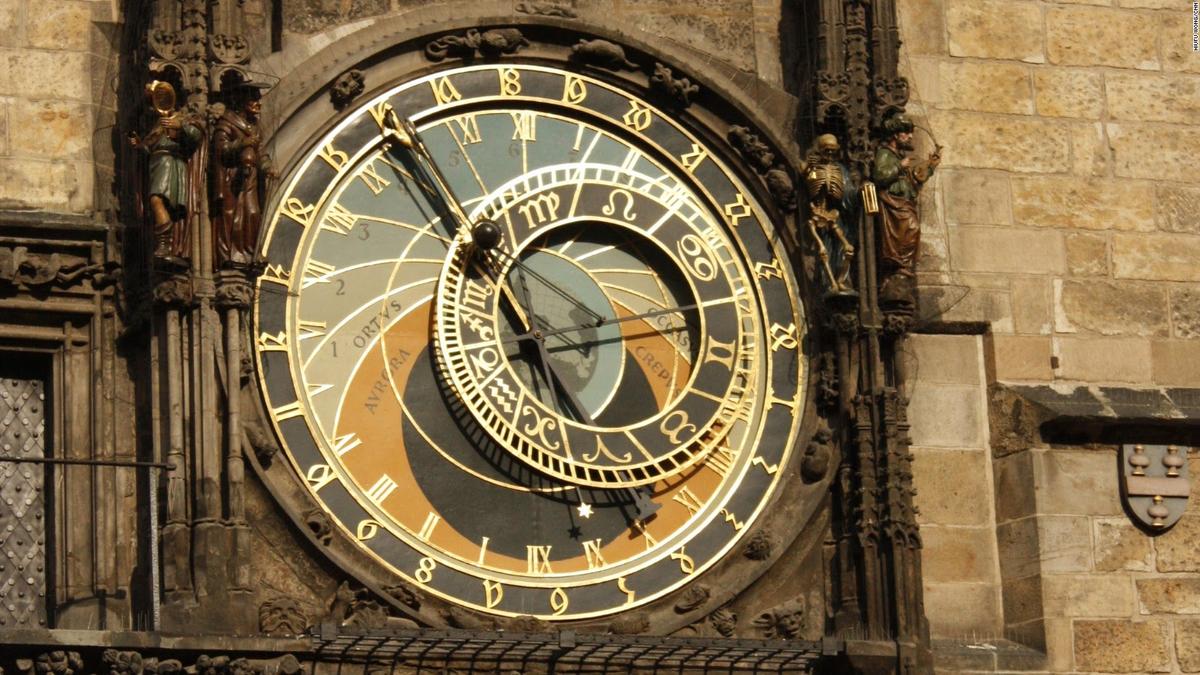

„Jak plynou vteřiny, díváme se zpět na to, co jsme v našich životech prožili.“ Jak plynou minuty, vidíme, co jsme promeškali, části našich životů, které jsme udrželi. Jak plynou hodiny, myslíme na to, co jsme se naučili, co jsme učili jiné, na co jsme zapomněli. Jak plynou dny, přejeme si, abychom toho mohli hodně vrátit. Přejeme si, abychom nikdy nebojovali. Doufáme, že se na nás nezapomene. Jak plynou roky, osamostatníte se. Všichni vyrostli, jsou ženatí/vdaní někde pryč nebo sami. Jak váš život plyne, stojíte hrdě a díváte se, jak dobře jste se vychovali. Vedli jste si dobře. Žijte dál…"
(Jak plyne čas, Jenni-fiere M. Bivens)
Co je čas? Jednoduše řečeno, můžeme říci, že čas je číslo, které čteme na hodinách. Ale to je příliš zjednodušené. Čas je mnohem více, než jen číslo zobrazeným na hodinách. Správná definice času spočívá v tom, že jde o neurčitý pokračující vývoj existence a událostí, ke kterým dochází ve zdánlivě nevratném sledu od minulosti, přes přítomnost, do budoucnosti (Oxford Languages a Google). Jednotkou SI pro čas jsou sekundy. Mohli bychom také říci, že to je skalární veličina, což znamená, že má pouze velikost, ale žádný směr. Skalární veličiny tedy často označují čas jako měření let, měsíců, týdnů, dnů, hodin, minut, sekund a dokonce milisekund. My lidé používáme pojem času k tomu, abychom události umístili do sekvence jednu po druhé, abychom porovnali, jak dlouho událost trvá, a abychom zjistili, kdy k události dojde. To jsou tři klíčové rysy času.
Vědci se ale diví, kde se vůbec vzal koncept času? Čas se začal zkoumat v roce 8000 před naším letopočtem. Ve Skotsku na Warrenově poli byl nalezen lunární kalendář, jehož datum pochází z roku 8000 před naším letopočtem, což bylo během mezolitu. Měření času začalo ve starověkém Egyptě kolem roku 1500 před naším letopočtem. Čas nebyl měřen stejně jako dnes. Pro Egypťany, a po další tři tisíciletí, bylo základní jednotkou času období denního světla. Později, v roce 1250 před naším letopočtem, lidé žijící v Řecku rozdělili čas na den a noc po 12ti hodinách. Staří Řekové měli pro čas dvě slova: chronos a kairos. První označuje chronologický nebo postupný čas, zatímco druhý označuje vhodný nebo vhodný čas na akci. Zatímco chronos je kvantitativní, kairos má kvalitativní, trvalou povahu. Kairos také v moderní řečtině znamená počasí. Bůh jménem Chronos byl králem Titánů a také bohem času, zejména v době, kdy byl považován za ničivou a vše pohlcující sílu. Poté v roce 350 př. nl. řecký myslitel Aristoteles vytvořil poměrně moderně znějící definici času jako „vypočítatelnou míru pohybu s ohledem na před a po“, to znamená, že čas představuje řadu změn s ohledem na minulost a budoucnost.


Mnoho lidí se ptá, jaká je filozofie času. Všichni živočichové, kromě lidí, žijí v neustálé přítomnosti, bez smyslu pro časové rozlišení minulosti, přítomnosti a budoucnosti. Naše vědomí času je proto jedním z nejdůležitějších charakteristických rysů lidstva a jednou z věcí, které nás skutečně oddělují od nižších živočichů. Čas je nepřetržitý a jde vnitřním směrem nebo řádem, což znamená, že události jdou z minulosti do budoucnosti. Čas je objektivní, a nikoli subjektivní a nezávislý na vědomém prožívání. Dokazuje to téměř univerzální dohoda o časovém pořadí tolika událostí, psychologických i fyzických, a skutečnost, že tolik různých fyzických procesů nese vzájemně konzistentní časové vztahy. Příkladem toho je rotace Země nebo frekvence kmitání kyvadla. Existuje mnoho různých názorů a přístupů k tomu, jaký je ve skutečnosti čas, mnoho myšlenek bylo předloženo v průběhu staletí. Ve starověkých filozofiích Indie a Řecka bylo jedním z hlavních sporů to, zda je čas lineární nebo cyklický a zda je nekonečný nebo konečný. Během doby osvícení v 17. a 18. století, v raně novověké filozofii, lidé zvažovali otázky o tom, zda je čas skutečný a absolutní, nebo jde pouze o abstraktní intelektuální koncept, který lidé používají k řazení a porovnávání událostí. Poté, v 19. století, se filozofové začali ptát, zda je současnost skutečně okamžitým konceptem nebo trváním, a zastánci konvencionismu i fenomenologie přispěli do debat o čase. Moderní filozofie nadále spekuluje o tom, zda je čas skutečný nebo „nereálný“, zda je čas napjatý nebo beztížný, zda je přítomnost okamžitá nebo doba trvání, zda lze říci, že minulost a budoucnost skutečně existují, a jakým způsobem objekty přetrvávají v čase. Filozofie času tedy obecně ještě nebyla prozkoumána do hloubky, ani přesně nevíme, jestli čas plyne jedním směrem.
Čas je velmi záhadná věc, kterou je třeba zkoumat. Věděli jste, že za rok uplyne celkem 31 557 600 sekund nebo že čas uběhne rychleji vaší tváři než vašim nohám (za předpokladu, že stojíte)? Vsadím se, že ne, protože o těchto věcech se běžně nemluví, když diskutujeme na téma čas. Einsteinova teorie relativity říká, že čím blíže jste ke středu Země, tím pomaleji čas plyne. Na vrcholu Mount Everestu by byl rok asi o 15 mikrosekund kratší než na úrovni moře, což je fascinující. Představte si, že pokud jste na Mount Everestu, můžete být už v roce 2021, ale ostatní lidé na Zemi by byli stále v roce 2020. Jejich škoda, vzhledem k tomu, jak hrozný tento rok byl.
Další věc, kterou čas skrývá pod svým povrchem, je skutečnost, že to, o čem si myslíte, že je den (délka rotace Země) není 24 hodin, ale je to 23 hodin, 56 minut a 4,2 sekundy. Důvod, proč je to 24 hodin od východu do východu slunce, je ten, že každý den se Země pohybuje dále na své oběžné dráze kolem Slunce a změna její polohy mírně prodlužuje den. V současné době bychom mohli říci, že rok má 365 dní, samozřejmě v závislosti na tom, kolik dní v únoru toho roku je, ale věděli jste, že když byli dinosauři naživu, měl rok 370 dní? To je dalších 5 dní v roce navíc. Ale má to vysvětlení. Důvod, proč jsme ztratili 5 dní, je ten, že rotace Země se zpomaluje, protože gravitace měsíce působí jako odpor, takže dny se prodlužují, přibližně o 1,7 milisekundy za století. Řekl vám váš učitel fyziky o nejmenší standardní vědecké míře času? Vsadím se, že ne. Název tohoto jevu je „Planckův čas“. Trvá asi pět set padesát tisíc bilionů bilionů bilionů Planckových jednotek, než jednou rychle zamrkáte. Jelikož se věnujeme fyzice, můžeme říci, že ve fyzice neexistuje nic takového jako termín „právě nyní“.
Prostor a čas jsou plynulé, ovlivněné gravitací a vaší rychlostí. Einstein to vyjádřil takto: „Pro nás fyziky je rozdíl mezi minulostí, přítomností a budoucností pouze iluzí, ať už je jakkoli trvalá.“ Einstein byl ve své době skutečný fyzik-mudrc, že?
Světlo si našlo čas, aby se k nám dostalo. Světlo, zrychli se! Protože jsi tak pomalé a trvá ti dlouho se k nám dostat, všechno, co vidíme, je v minulosti. Slunce, které vidíte z okna, je staré 8 minut a 20 sekund. Hezké osmiminutové narozeniny, slunce! Světlo z naší nejbližší hvězdy, Proxima Centauri, je staré 4 roky. Posledním zajímavým faktem je, že nejpřesnější hodiny, jaké kdy byly postaveny, jsou hodiny Strontium, které jsou přesné na sekundu po dobu více než 15 miliard let.
Karolína Hájková, 4. ročník